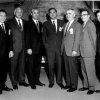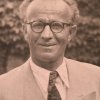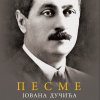Pioneers in the United States Space Program
Seven Americans of Serbian descent have had the distinct honor of participating in the construction of Apollo spaceships and by their professional ability and knowledge have contributed to opening the inroads of the infinity of space to our civilization.
.- Milojko Vucelic: Senior manager for landing astronauts on the moon, Vucelic controlled the analysis of loading Apollo while in flight in space, analysis of the rendezvous around the moon and the direct landing on the moon.
- Danilo Bojic: Chief Engineer and specialist for "Service propulsion system and Reaction control system" of the Apollo program.
- Pavle Duic: Engineer for electrical energy for the Apollo spaceship during the flight to the moon.
- Milisav Surbatovic: Engineer for system of docking and separation of spaceships during space flight.
- Petar Galovic: Engineer for "Emergency Hatch System".
- Slavoljub Vujic: Engineer for research on malfunction of electronic instruments for the Apollo and Saturn programs.
- David Vuich: Responsible for coordination of the program between North American Rockwell and NASA and other companies involved in the building of Apollo.
Shortly after the return of Apollo 11 from the moon, Serbs who worked on the Apollo program gathered together for this photo in front of the spaceship.





